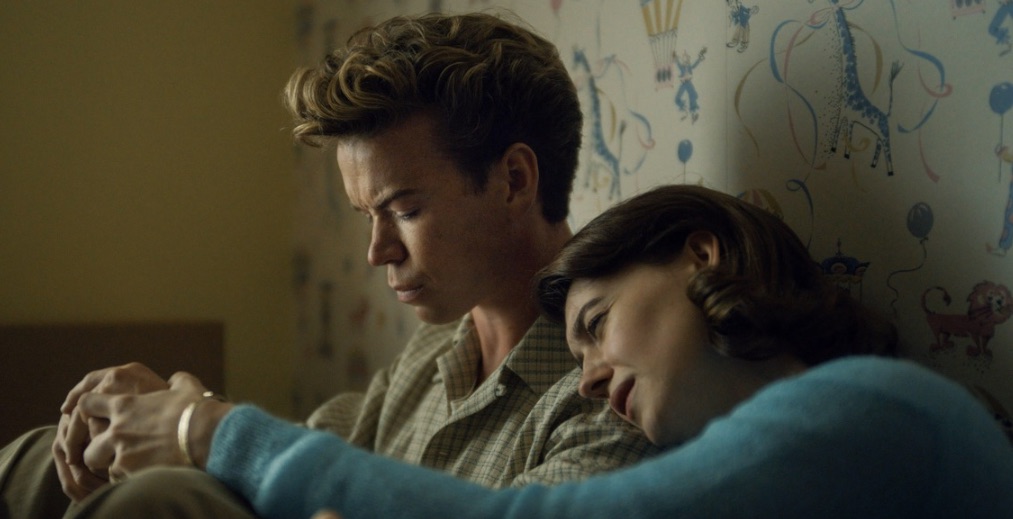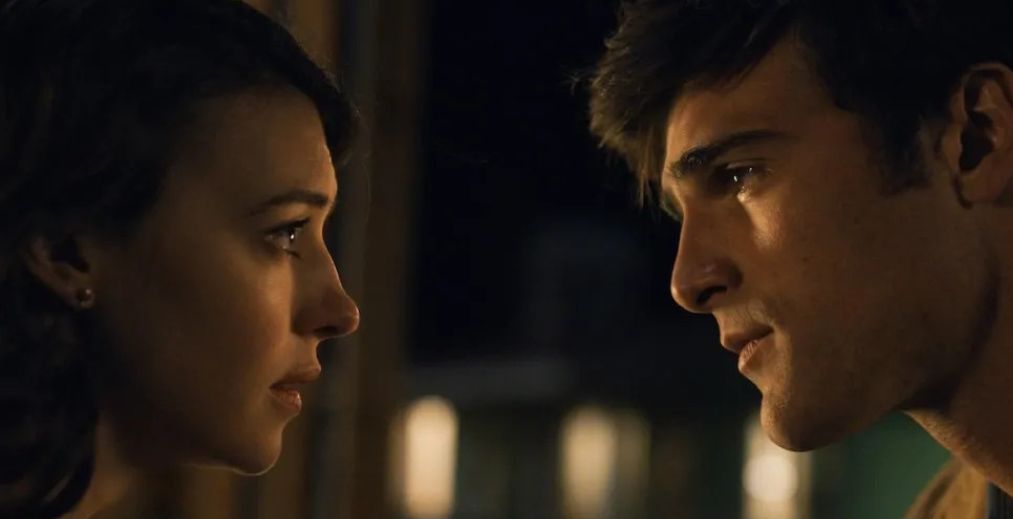As the cinematic landscape grows, so does the depth of topics the movies explore. Sexuality, in particular, has been explored in wildly different and interesting ways as of recent. On Swift Horses represents a regression. Prolific TV director Daniel Minahan, best known for work on Deadwood and Game of Thrones, stages a handsome, well-acted production that hinges on a weak script. On Swift Horses is anything but swift, a banal slog that only intermittently comes to life when it’s not trodding over a well-beaten path.
In the aftermath of the Korean War, Lee (Will Poulter) tries to start a new life with his wife, Muriel (Daisy Edgar-Jones). His plans are interrupted when Lee’s cousin Julius (Jacob Elordi) comes to visit. Julius’ rough and tumble free spirit quietly encourages Muriel’s own, leading hers to pursue a crush on her neighbor Sandra (Sasha Calle). Meanwhile, Julius starts a new job at a casino, where he’s quickly enamored by his coworker Henry (Diego Calva). As the feelings turn mutual, Julius finds himself in the midst of self-discovery complicated by Henry and his continuing foray into the gambling world.
On Swift Horses at least looks like it is a prestige picture. Cinematographer Luc Montpellier stages sharp, eye-catching images that look like cozy paintings made in the 1950s. The production design from Erin Magill steals the show, crafting a post-Korean War America that feels like it’s born out of the collective image of that area.
Whether or not it may look more like a nostalgia-infused tableau than the actual 1950s or not hardly matters, as the aim is to conjure the idea of the period as one of transition, where the nuclear family values are starting to crack under a new spirit of freedom. The white-picketed fence and idyllic nature of Lee’s home compared to, say, the bright lights of the casino or even a rowdy party at Sandra’s hammers that home.
Strong performances can’t save On Swift Horses.

For the most part, the acting is pretty great across the board. Elordi still has yet to show me anything as impressive as his turn in Saltburn, but his work here is solid, subtle stuff. Edgar-Jones also lends a believability to her character’s journey, although the script lets her down. Lee is easily the most interesting character in the film because Poulter (Death of a Unicorn) doesn’t play his confusion at the changing tides as a steadfast roadblock. Instead, Poulter imbues an empathy for someone whose perfect vision of a life starts falling apart. Diego Calva (Babylon) and Sasha Calle (The Flash) give sorely underutilized, achingly real performances that indicate great things for both performers on the horizon.
The common denominator is in the failings of Bryce Kass’ script. Based on the novel of the same name by Shannon Pufal, On Swift Horses feels like it’s playing notes that we’ve heard a million times before. We’ve seen so many stories of white people with forbidden desires set in the 1900s that another movie like this needs to justify itself.
The script for On Swift Horses doesn’t even attempt to set itself apart, telling a milquetoast story that’s only interesting when it takes unrelated divergences, like Muriel’s interest in horse racing or the world of casinos. A bigger issue is that the story lacks humanity despite the actors giving it their best shot. The audience observes these characters rather than getting to live with them.
More than anything, Daniel Minahan’s film lacks passion. Not exploring sexuality in a fresh or even engaging way, On Swift Horses is a pretty idea of a film rather than a thoughtful examination. When a romance or a film involving romantic feelings has a bite to it, it makes up for a lot of flaws. On Swift Horses has it backward, staging an admirable production that’s toothless.
On Swift Horses had its U.S. premiere on March 13 at the 2025 SXSW Film and Television Festival. The film will be released in theaters on April 25.
On Swift Horses
-
Rating - 3/103/10
TL;DR
Daniel Minahan’s film lacks passion. Not exploring sexuality in a fresh or even engaging way, On Swift Horses is a pretty idea of a film rather than a thoughtful examination.







